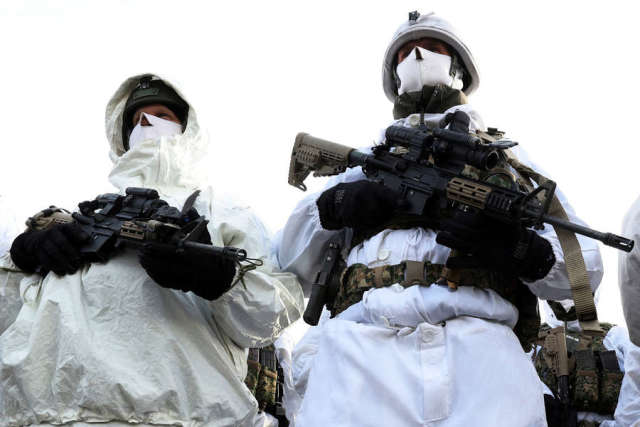Russia believes that NATO creates a "risk of unintended clashes" in the Arctic region
The Russian Foreign Ministry said that NATO's activity in the Arctic could lead to "the risk of unintended collisions." This is how Moscow reacted to the NATO exercise Cold Response 2022 ("Cold Response"), the naval part of which was held in the Norwegian Sea. "Newspaper.Ru" understood the specifics of the Arctic confrontation between Russia and NATO.
The Cold Response 2022 exercises became the largest NATO maneuvers in the region over the past 30 years - they involved about 30 thousand military personnel from 27 countries, including alliance partners Finland and Sweden, as well as about 220 aircraft and more than 50 ships and vessels.
"During the exercises, the amphibious landing on the coast was practiced under the cover of fleet forces, combat aircraft and air defense systems, which indicates the offensive nature of the maneuvers, and not defensive, as they were declared in NATO," he told the newspaper.Ru" military expert, political scientist Valery Volkov.
The ship of the Northern Fleet of the Russian Navy "Admiral Gorshkov" monitored the progress of these exercises, the theater of which unfolded 200 km from the Russian border. At the same time, Russia announced retaliatory exercises involving 140 ships and more than 60 aircraft, which will take place in the northern waters of the Atlantic Ocean, in the Okhotsk and Northern Seas.
Nikolai Korchunov, Ambassador-at-Large of the Russian Foreign Ministry, Chairman of the Committee of Senior Officials of the Arctic Council, expressed serious concern about the activation of NATO in the region.
- Korchunov declared.
According to the diplomat, the risks in the Arctic have noticeably increased since the end of March 2022, when the United States, Canada, Denmark, Iceland, Norway, Sweden and Finland temporarily suspended their activities in the Arctic Council, which includes Russia.
"The reason given was the conduct of a Russian special military operation in Ukraine. As a result, one of the few levers for resolving emerging situations in the Arctic, related, among other things, to the presence of warships here, has lost its force. The danger of conflict in the Arctic has ceased to be purely theoretical," Valery Volkov believes.
On the growth of risks in connection with the actual blocking of the work of the Arctic Council "to the Newspaper.Ru" was also told by a military expert, captain of the 1st rank of the reserve Viktor Makarov.
"The Arctic is rapidly becoming a potential collision zone with the use of military forces and means. Russia has a powerful Northern Fleet here, an Arctic grouping that includes an air defense system, VKS facilities that can be based on built and restored Arctic airfields, mobile units of motorized rifle brigades and marines. One of our main advantages here is the presence of a nuclear icebreaker fleet, which allows us to be present in the Arctic all year round," Makarov believes
The expert added that the United States has only two icebreakers in the region, but Washington has ordered four more icebreakers.
"A year ago, the Pentagon adopted an updated Arctic strategy, in which special attention is paid to the main competitors. Washington considers Russia and China to be them. A key element of the program is the deployment of the MDTF (Multi-Domain Task Force) task force in Alaska, which will consist of electronic warfare, artillery, air defense and missile defense forces, as well as intelligence and cyber operations specialists. The MDTF's potential is comparable to a full-fledged division," Makarov added.
Currently, about 50 military infrastructure facilities of NATO countries are located in the Arctic. In the Arctic region, they have 22 airfields, 23 naval bases, bases, as well as four nuclear strike warning radar stations. The total number of the contingent located at these facilities is 19 thousand people.
"Russia will be forced to increase its presence in response to the activation of NATO forces. At the same time, the absence of two-way communication multiplies the dangers. Not even out of malice, but because of inconsistency. Both our forces and the alliance forces may be in the same place. Communication is now disrupted not only through the Arctic Council, but also through many working groups of the Russia-NATO Council. Now it is important to hear each other, even if the positions are perpendicular, and not to break off contacts," Volkov concluded.
Victor Sokirko



